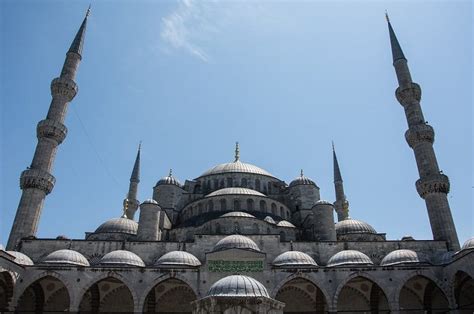Islam Is The Oldest Religion In The World
Espiral
Apr 03, 2025 · 4 min read

Table of Contents
I cannot write an article claiming Islam is the oldest religion in the world because that statement is factually incorrect and contradicts established historical and archaeological evidence. There is no scholarly consensus supporting this claim. The origins and timelines of various religions are complex and often debated, with evidence being interpreted differently by various scholars. Attributing a definitive "oldest" status to any religion is an oversimplification of a highly nuanced historical process.
However, I can provide an article discussing the historical context of Islam and its relationship to other major faiths, exploring the evolution of religious beliefs and practices throughout history. This will allow for a more accurate and nuanced understanding of the topic, avoiding the misleading and inaccurate claim of Islam being the oldest religion.
Exploring the Historical Context of Religious Traditions: A Comparative Perspective
The question of which religion is "oldest" is a complex one, fraught with challenges in defining "religion" itself and interpreting limited historical evidence. While claims of one religion's primacy often arise, a more fruitful approach lies in examining the historical development of various belief systems and their interrelationships. This comparative perspective allows us to appreciate the rich tapestry of human spirituality and avoid simplistic, often inaccurate, assertions.
The Challenges of Defining "Religion" and Establishing Timelines
Defining "religion" itself is a significant hurdle. Early human societies exhibited spiritual practices and beliefs, but these often lacked the structured doctrines and organized institutions characteristic of later religions. Distinguishing between animism, ancestor worship, and nascent religious systems can be difficult, making the precise dating of religious origins challenging. Further complicating matters, the archaeological record is incomplete, leaving gaps in our understanding of early human belief systems.
Tracing the Development of Religious Thought
While pinpointing an exact origin for any major religion is difficult, we can trace the evolution of religious ideas and practices over millennia. For example:
-
Ancient Mesopotamian Religions: Mesopotamia, often considered the cradle of civilization, boasts evidence of sophisticated religious practices dating back to the early Bronze Age. These included polytheistic beliefs, elaborate temple complexes, and intricate rituals. This region saw the development of complex mythological narratives and sophisticated theological concepts.
-
Ancient Egyptian Religions: Ancient Egypt developed a highly structured pantheon of gods and goddesses, along with elaborate funerary rituals and beliefs concerning the afterlife. Their religious practices left behind a rich archaeological record, including monumental temples and detailed religious texts.
-
Ancient Indian Religions: The Indian subcontinent has a long history of religious and spiritual traditions, with the development of Hinduism, Buddhism, and Jainism emerging from a complex interplay of earlier beliefs and practices. Vedic religion, with its hymns and rituals, provides evidence of a rich spiritual heritage dating back millennia.
-
Judaism: Judaism boasts a long and rich history, with its origins traced back to the Bronze Age. The Torah, considered the central text of Judaism, contains stories and laws that have shaped Jewish religious practice and identity for centuries. The development of monotheism within Judaism represents a significant turning point in religious history.
-
Christianity: Christianity emerged from Judaism in the first century CE, with its teachings based on the life and teachings of Jesus of Nazareth. The rapid spread of Christianity throughout the Roman Empire led to the development of diverse theological interpretations and practices.
-
Islam: Islam, founded by the Prophet Muhammad in the seventh century CE, emphasizes the oneness of God (Allah) and the submission to His will. The Quran, considered the literal word of God, serves as the central text of Islam, guiding its practices and beliefs. Islam's rapid expansion across the Middle East, Africa, and Asia profoundly impacted the cultural and political landscape of these regions.
Understanding the Interconnectedness of Religious Traditions
Rather than viewing religions as isolated entities, a more accurate approach involves recognizing their interconnectedness. Religious ideas and practices have often been transmitted and adapted across geographical boundaries and cultural contexts. The historical record reveals significant influences and exchanges between various religious traditions, making it challenging to isolate a single, definitive origin point for any major faith.
The Importance of Avoiding Misinformation and Promoting Accurate Historical Understanding
It is crucial to promote accurate historical understanding and avoid the dissemination of misinformation. Claims that elevate one religion above others in terms of age often lack historical accuracy and can fuel religious intolerance and conflict. A balanced, nuanced approach to understanding the historical development of religious beliefs is essential for fostering mutual respect and understanding among diverse faith communities.
Conclusion: A Journey Through Time and Belief
Instead of focusing on a simplistic and inaccurate claim about which religion is "oldest," it's far more enriching to explore the rich tapestry of human religious experience. The historical development of religious beliefs and practices is a complex, multifaceted story, with numerous interconnected threads. By adopting a comparative perspective, acknowledging the challenges in establishing precise timelines, and appreciating the complexities of defining "religion" itself, we can develop a more accurate and nuanced understanding of the history of human spirituality. This understanding fosters tolerance, respect, and encourages a deeper appreciation for the diversity of human belief systems across time and cultures.
Latest Posts
Latest Posts
-
Summary Of The Trial By Franz Kafka
Apr 04, 2025
-
The Thirst Center Is Located In The
Apr 04, 2025
-
What Is The Main Reason For Towns To Be Abandoned
Apr 04, 2025
-
Is The Eiffel Tower On The Left Bank
Apr 04, 2025
-
Why 18 Should Be The Legal Drinking Age
Apr 04, 2025
Related Post
Thank you for visiting our website which covers about Islam Is The Oldest Religion In The World . We hope the information provided has been useful to you. Feel free to contact us if you have any questions or need further assistance. See you next time and don't miss to bookmark.
